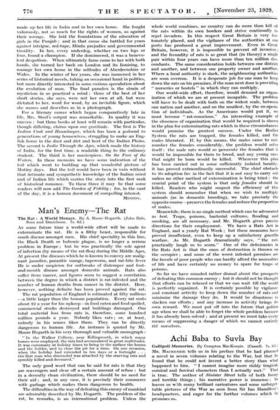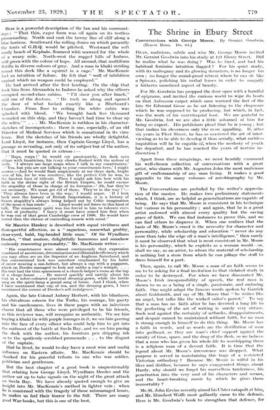Achi. Baba to Suvla. Bay
Gallipoli Memories. By Compton MacKenzie. (Cassell. 7s. 6d-) MR. MACKENZIE tells us in his preface that he had planned a novel in seven volumes relating to the War, but that he found that he could not invent a better story than what happened to him. " I cannot imagine more richly tragical, comical and farcical characters than I actually met." That is true. The author of Sinister Street tells of both funny and terrible things ; his narrative power is immense ; he leaves us with many brilliant caricatures and some unforget- table pictures of the War as seen from Sit Ian Hamilton':, headquarters, and eager for the - further volumes' which he promises us. Here is n pawerful description of Sir Ian and his. surround- ings " That thin, eager form was. off again on its restless promenading. North and east the tawny line of cliff along it blue horizon. Southward the rolling dunes on which presently the tents of G.H.Q. would be pitched. Westward the soft sandy beach of Kephalo, flounced with seaweed for the whole of a weary mile.. North-west the rugged hills of Imbros, still green with the colour of hops. All around, that multiform flotilla in diverse colours of grey. And a man in khaki striding round this deck like a squirrel in a cage." Mr. MacKenzie had an intuition of' failure. He felt that " wall of inhibition against which no weapon could be employed."
He had arrived after the first landing. On the ship that took him from Alexandria to Imbros he asked why the officers occupied second-class cabins. " I'll show you after Iunch," said one of the doctors. " He took us along and opened the door of what looked exactly like a Bluebeard's Chamber. From floor to ceiling the white cabin was splashed with blood. ' We brought back five thousand wounded on this ship, and they haven't had time to clear up the relies.' " . . . Mr. MacKenzie is ruthless in his character- sketches of incompetents : there is one, especially, of an old Director of Medical Services which is sensational in its viru- lence. But the sketches of his friends are wholly delightful. Lord Lloyd, for instance, then Captain George Lloyd, has a passage so revealing, not only of its subject but of the author, that it must be quoted in extenso Maps, maps ! ' he would cry passionately, his dark eyes ablaze with fanaticism, his ivory cheeks flushed with the ardour of faith. ' I always use large maps when I talk to my constituents.' —` Yes, but you are not talking to your constituents here,' I might answer.—And he would flash suspiciously at me those dark., bright eyes of his, for he was sensitive, like the perfect Celt he was, to the faintest hint of ridicule. Then I might ask him how with his faith in the divine right of the British Empire, he could excuse the stupidity of those in charge of its fortunes= Ah, but they're not necessary. We must get rid of them. They're in the way ! — 'They always have been in the way,' I would argue. ' If I look back over the history of British Imperialism, it is a history of Saxon stupidity's always being helped out by Celtic imagination of the mesa it has made.' . . Lloyd would not listen to thia kind of talk. The missionary spirit was too fervid in him to tolerate even a hint of profanity. I fancy it must have seized him first when he was cox of that great Cambridge crew of 1900: He would have tasted then the elation of controlling muscle with mind."
Sir Maurice Hankey is described with equal vividness and disrespectful affection, as a " sagacious, somewhat grubby, clear-eyed, bald, big-headed little man." Of Sir Wyndham Deedes, " that austere, delightfully humorous and somehow curiously reassuring personality," Mr. MacKenzie writes :— " His countenance wore almost continuously that expression combined of asceticism, determination and illimitable-efficiency which you may often see on the Superior of an Anglican Sisterhood, and this conventional look was somehow emphasized by his habit of never wearing a sun-helmet, but always a cap with a puggaree, which on Deedes managed to look not unlike a nun's wimple. . . . His tent had the trim sparseness of a church-helper's room. at the top of a clergy-house . . . He moved quickly and nattily about his tent in a sober-coloured practical dressing-gown, while the kettle sang on the spirit-lamp a genial song of home. And I think, when I have mentioned that cup of tea, and the dressing gown, I have mentioned the extent of Deedes's self-indulgence."
Again, the late Colonel Aubrey Herbert, with his blindness, his chivalrous esteem for the Turks, his courage, his gaiety and his carelessness, lives in these pages with an infectious charm that all those who were privileged to be his friends, as this reviewer was, will recognize as authentic. We see him buying a khaki tie with purple lozenges in it, we see him peering into the face of every officer who could help him to get into the midmost of the battle at Suvla Bay, and we see him pacing the deck with the author, his fountain pen dripping ink m to the spotlessly scrubbed promenade . . . to the disgust of the captain.
Had he lived, he would to-day .have a most wise and useful influence on Eastern affairs. Mr. MacKenzie should be thanked for his graceful tribute to one who was soldier, politician and gentleman.
But the best chapter of a good book is unquestionably that relating how George Lloyd, Wyndham Deedes and the author sat up to take signals on the night of the great attack on Suvla Bay. We have already quoted enough to give an insight into Mr. MacKenzie's method in lighter vein : when he is concerned-with the'fragedy-of those mismanaged honts, he makes us 'feel. their horror" to the`fult. There are many good War-books, but this is one of the best.































































 Previous page
Previous page